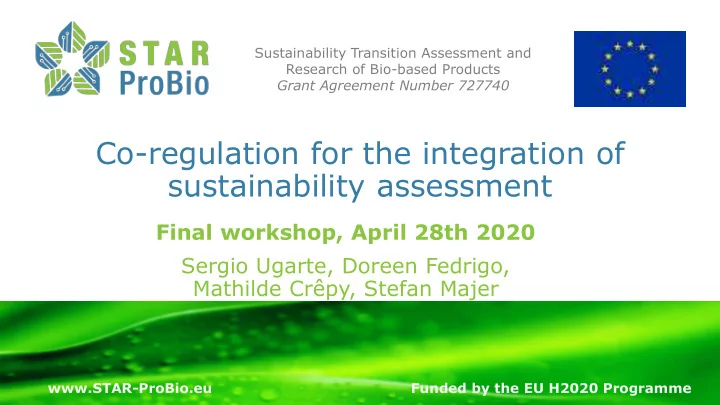

Sustainability Transition Assessment and Research of Bio-based Products Grant Agreement Number 727740 Co-regulation for the integration of sustainability assessment Final workshop, April 28th 2020 Sergio Ugarte, Doreen Fedrigo, Mathilde Crêpy, Stefan Majer www.STAR-ProBio.eu Funded by the EU H2020 Programme
Content Introduction Mainstreaming sustainability in EU policy Co-regulation as policy option Proposal for an overarching EU co-regulation framework Policy recommendations www.STAR-ProBio.eu Funded by the EU H2020 Programme
Introduction Relevant sustainability issues take place increasingly outside the fences of the company, often in other countries and other continents. EU and Member State legislation can regulate certain sustainability aspects, but only within their geographical jurisdiction. Co-regulation is an alternative solution or a complement to conventional regulation. The EU has gained experience with the RED and EUTR. A co-regulation framework is proposed to promote the sustainability of the broader bio-based products in the European Union www.STAR-ProBio.eu Funded by the EU H2020 Programme
Mainstreaming sustainability in EU policy Is there a mandate? Art. 11 of the Treaty (Functioning of the EU) on environmental protection in policy. New European Consensus on Development (2017) and its 5 pillars: People, Planet, Prosperity, Peace and Partnership. However, and despite decades of efforts on sustainable development, scientific warnings on several planetary emergencies have increased in urgency and frequency. European Green Deal calls for the efficient implementation of the EU Bioeconomy Strategy, and recognises that the EU can mobilise its neighbours and partners. www.STAR-ProBio.eu Funded by the EU H2020 Programme
EU/MS Policies on sustainability assessment Fragmentation of policies per sector. Influence on industry is low. No “hot spot sector” identified. Specific targets in 72% of policies, but only 50% are quantifiable. Sustainability requirements in 56%,non- commital, focusing on environmental risks mainly. Comprehensive consideration of social & economic risks found in 12/50 policies. Strictest requirements are found in RED. www.STAR-ProBio.eu Funded by the EU H2020 Programme
Co-regulation as policy option www.STAR-ProBio.eu Funded by the EU H2020 Programme
Proposal for an EU co-regulation framework It pushes public procurers to purchase sustainable bio-based products. Relevant sectors (Bioeconomy Strategy) are: Construction, chemicals, plastics, textiles, furniture, packaging and cosmetics. Target policy instrument: Sustainable Product Framework initiative (featured in the new Circular Economy Action Plan). Decisions to be made: ▪ Mandatory or voluntary sustainability requirements? Mandatory provides the most effective legal framework (EUTR, Energy performance). Voluntary: RED, Ecolabel. 1 st or 3 rd party verification? Mandatory 3rd party verification provides the most effective legal ▪ framework. Voluntary verification and market surveillance might be considered for bio-based products with low risk levels of environmental and social impacts. ▪ Institutional organisation: Best served by DG Environment in cooperation with DG CLIMA, ENER, GROW and TRADE. www.STAR-ProBio.eu Funded by the EU H2020 Programme
Policy recommendations (i) 1.Set more concrete goals in strategies and framework policies. • EU policy to set targets for resource use and efficiency. • EU’s Bioeconomy Strategy to further define sustainability for bio -based products . • The Bioeconomy to go beyond a cradle to gate approach and provide more clarity on the use phase and end-of-life management. • EU’s product policy to better account for bio -based products. 2.Prioritise sectors and products (through the Sustainable Product Policy Initiative). ▪ Horizontal sustainability principles that can be modified according to sector ▪ Sectoral strategies, policies and legislation to have clear biological resources targets. www.STAR-ProBio.eu Funded by the EU H2020 Programme
Policy recommendations (ii) 3.Specify sustainability requirements and methodologies. ▪ Develop horizontal approaches across policy instruments. ▪ Set a minimum biomass content together with sustainable biomass criteria. ▪ Further embed LCA in EU policy as important decision-making tool. ▪ Make sustainability criteria product specific where needed. ▪ Explore a multi- criteria approach for a ‘fuller’ treatment of sustainability. 4.Introduce the use of sustainability assessment tools in a co-regulative framework ▪ Accelerate more coherence and harmonised approach between EU policy mechanisms. ▪ Give more clarity regarding integration of legislation and certification schemes. www.STAR-ProBio.eu Funded by the EU H2020 Programme
Acknowledgements Contact ▪ Doreen Fedrigo Sergio Ugarte ▪ s.ugarte@sqconsult.com ▪ Mathilde Crêpy ▪ +34 661 -485 -801 ▪ Stefan Majer www.star-probio.eu This project is funded by the European Union’s Horizon 2020 Research and innovation action under grant agreement No 727740 with the Research Executive Agency (REA) - European Commission. Duration: 36 months (May 2017 – April 2020). Work Programme BB-01-2016: Sustainability schemes for the bio-based economy www.STAR-ProBio.eu Funded by the EU H2020 Programme
Recommend
More recommend